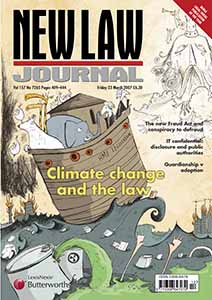
Are websites responsible for users’ behaviour? Richard Scorer asks where we should draw the line online
HM Revenue & Customs (HMRC) has won a court victory against VAT ‘carousel’ fraud.
More than 1,000 legal aid solicitors took to the streets this week to protest against proposed changes to the legal aid system that they say will hit the poorest members of society.
Proposals to relax fingerprinting restrictions and allow police to question suspects until the time of their trial—even after charges have been made—have been attacked by lawyers and civil rights campaigners.
A substantial proportion of traditional smaller law firms will disappear over the next few years to make way for more efficient legal services providers, a leading legal academic predicts.
The House of Lords’ ruling that two men must pay living expenses for the time they spent in jail for crimes they did not commit “added insult to injury”, says the solicitor for the men.
Lawyers are maximising the opportunities presented by climate change, says Paul Clarke
In his final article on the Fraud Act 2006, Nicholas Yeo discusses the common law conspiracy to defraud
Mobilix Ltd v Revenue and Customs Commissioners [2007] All ER (D) 351 (Feb)
R (Stellato) v Secretary of State for the Home Department [2007] UKHL 5, [2007] All ER (D) 251 (Mar)
MOVERS & SHAKERS

Hugh James—Jonathan Askin
London corporate and commercial team announces partner appointment

Michelman Robinson—Daniel Burbeary
Firm names partner as London office managing partner

Kingsley Napley—Jonathan Grimes
Firm appoints new head of criminal litigation team






